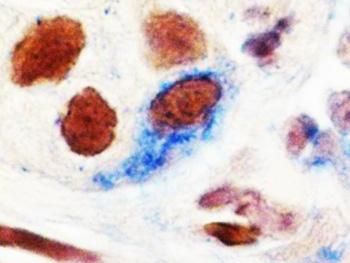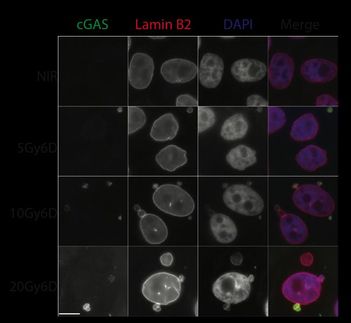Biomarkers: What can they tell us
As cancer researchers move away from the general use of chemotherapy and into more targeted approaches, scientists are working to discover effective ways to measure response and risk. Data presented at the CTRC-AACR San Antonio breast cancer Symposium illustrate the cutting edge of biomarker discovery and development.
Reductions in Breast Density Predict Potential Benefit of Tamoxifen (Jack Cuzick, Ph.D.)
A reduction in breast density of at least 10 percent may predict who benefits from the breast cancer preventive effects of tamoxifen. Researchers studied 1,063 women and found that those with reduced breast density after 12 to 18 months of treatment had a 52 percent reduced risk of breast cancer. By contrast, those women who did not have a decrease in breast density had only an eight percent risk reduction.
Poor Prognosis on Small, HER2 Positive Tumors (Ana M. Gonzalez-Angula, M.D)
Although current guidelines call for no further therapy after surgery on breast tumors one centimeter or smaller, a new study suggests that if these tumors are HER2 positive patients have an increased risk for relapse. In the largest study of its kind to date (n=1,315, including a validation set), researchers found that the five-year recurrence rate was 23 percent among patients with small HER2-positive tumors, compared with eight percent in other tumor types.
New Genetic Modeling Improves Screening (Kathie Dalessandri, M.D.)
A new genetic model based on 22 single nucleotide polymorphisms may improve the ability to predict risk of developing breast cancer. Researchers found that in a high-risk population from Marin County, California, this model improved diagnostic accuracy by 51 percent compared to classic risk factors alone.
New Biomarker Predicts Anthracycline Response (John Bartlett, Ph.D.)
The presence of chromosome 17 polysomy effectively predicted which patients would benefit from adjuvant anthracycline chemotherapy. Researchers analyzed 1,625 samples from NEAT (National Epirubicin Adjuvant Trial) and found that those patients with C17 polysomic tumors had significantly greater benefit from epirubicin than those without, even when taking HER2 status into consideration. Researchers suggest that this may explain the apparent association of anthracycline sensitivity and HER2 status which is located on this chromosome.
Biomarkers May Not Identify Proper Chemotherapy Treatment (Angelo Di Leo, M.D., Ph.D.)
Chemotherapy treatment selection based on biomarkers may not yet be a valuable practice. Prior studies have suggested that HER2 and topoisomerase II (TOP2A) might predict sensitivity to particular chemotherapy agents. An interim analysis shows that HER2 and TOP2A have a clinically modest and statistically borderline predictive value.
Most read news
Other news from the department science

Get the life science industry in your inbox
By submitting this form you agree that LUMITOS AG will send you the newsletter(s) selected above by email. Your data will not be passed on to third parties. Your data will be stored and processed in accordance with our data protection regulations. LUMITOS may contact you by email for the purpose of advertising or market and opinion surveys. You can revoke your consent at any time without giving reasons to LUMITOS AG, Ernst-Augustin-Str. 2, 12489 Berlin, Germany or by e-mail at revoke@lumitos.com with effect for the future. In addition, each email contains a link to unsubscribe from the corresponding newsletter.


















































